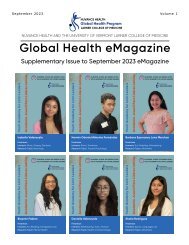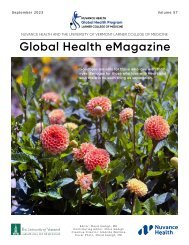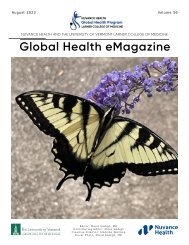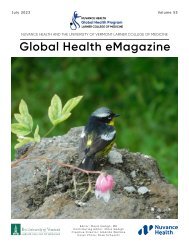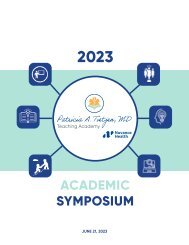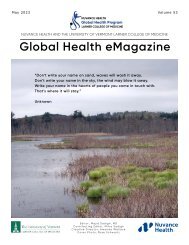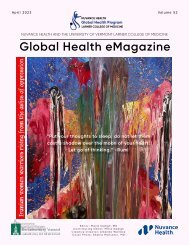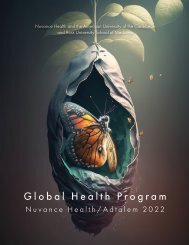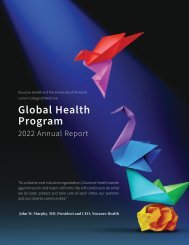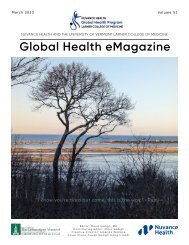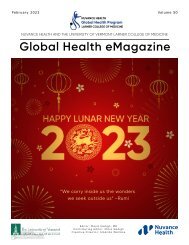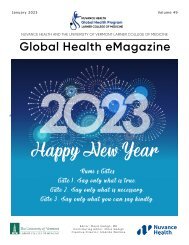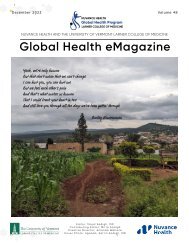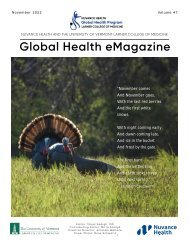eMagazine June 2023
You also want an ePaper? Increase the reach of your titles
YUMPU automatically turns print PDFs into web optimized ePapers that Google loves.
OUR PEOPLE,<br />
OUR MISSION<br />
Global Health<br />
<strong>eMagazine</strong><br />
<strong>June</strong> <strong>2023</strong><br />
Communication and transparency need to be either reinstated or developed post pandemic.<br />
With the primary care physician replaced in the hospital setting by hospitalist and intensivist<br />
along with snfist - then without timely communication and perfect electronic medical records<br />
that are secure and available-important information is lost, gaps in care occur and patients<br />
and the families suffer the consequences. A phone call or an in-person visit is best and should<br />
be done in addition to information provided in a patient portal. Some patients have 5-10 portals<br />
they need to manage and still data is missing or lost. Access to care and coordination of that<br />
care needs to be done across platforms and locations. Where is the care in healthcare?<br />
Environment of care needs to be upgraded with more privacy, that’s accessible space to meet<br />
the needs of a child, a person who uses a wheelchair, or a person with blindness or a hearing<br />
deficit and with resources and clean areas available to promote a patient’s independence,<br />
confidence, safety, and health while enabling front line healthcare providers to do their work.<br />
Healthcare administrators need to support the advancement of science with time for providers<br />
to conduct research, review literature and consult with colleagues. The interconnectedness<br />
of the world requires administrators and leaders to strengthen partnerships with colleagues<br />
across the world, as well as down the street and around the corner to improve public policy,<br />
encourage advocacy, and work on screening, health promotion and disease prevention. There<br />
are major changes in patterns and trajectories of health, disease, and aging and to improve<br />
and sustain change, healthcare leaders must adapt now to the changing world to ensure that<br />
the care is reinstated in healthcare and that it is sustainable.<br />
Perspective<br />
Global Health Academy<br />
Highlights<br />
Reflections<br />
Welcome<br />
Global Local<br />
Hispanic and Latinx Communities<br />
Voices of Ugandan Students<br />
Global Health Mental Health<br />
Art to Rwmind Us of Who We Can Be<br />
Our Beautiful Planet<br />
Innovation and Technology<br />
Nursing Division<br />
Women’s Health Education<br />
Among the Letters<br />
Announcements<br />
Article of the Month<br />
Video of the Month<br />
Congratulations<br />
Phoro News<br />
Calendar of Events<br />
Resources<br />
Comments<br />
Written by Mary Kincart, MS, RN<br />
Dr. Winkler has provided a candid and comprehensive look at the<br />
challenges in healthcare we face as a nation and worldwide. The<br />
work to restore healthcare systems has been greatly impacted<br />
socially, emotionally, physically, and financially by the Covid<br />
pandemic. In many ways healthcare has experienced great<br />
setbacks and in other ways we have learned to be nimbler, more<br />
resilient, and more innovative.<br />
Treatment of chronic illnesses and preventative health measures<br />
were suspended during the acute phase of the pandemic, leading to a backlog of unaddressed<br />
healthcare needs by many. In addition, the nation is experiencing a significant influx of migrants<br />
from other countries, placing an even greater strain on an already vulnerable system, and<br />
greatly impacting access to care.<br />
The loss of healthcare providers and staff, from illness and/or burnout, as well as the massive<br />
financial impacts on hospitals, practices and healthcare facilities, compel healthcare leaders<br />
to address these challenges in new and innovative ways. The past several years have forced<br />
us to think differently about how we deliver healthcare. Specialists such as Intensivists and<br />
Critical Care Nurses provided virtual guidance to ICUs to support care to a greater number<br />
of patients. Virtual visits became the “norm” for addressing the needs of patients with chronic<br />
illnesses as well as those that needed non acute medical attention. Pop-up mobile testing<br />
and vaccine stations were implemented. These are only a few examples of the capabilities<br />
of healthcare leaders that will prove to be invaluable as we work towards strengthening our<br />
Healthcare Systems in the future.<br />
In a recent publication by Forbes contributor Bernard Marr, Dec 6, 2022, Mr. Marr provides<br />
an overview of trends that are addressing some of the challenges described in Dr. Winkler’s<br />
article. Mr. Marr describes the many uses of artificial intelligence in healthcare delivery. He gives<br />
examples such as remote surgery, virtual hospital wards, virtual homecare and the building of<br />
online communities linked to specific health conditions that can provide information, education,<br />
and support. The public has already integrated the use of wearable medical devices to monitor<br />
health and track sleep patterns, activity, vitals signs, blood pressure, and EKGs to aid in the<br />
management of chronic medical conditions.<br />
Financial recovery also requires resiliency and innovation. Administrators and Leaders must<br />
support the optimization of private and Medicare/Medicaid value-based care models without<br />
further burdening the frontline providers and staff. Embracing the opportunities made available<br />
through technology and artificial intelligence affords our healthcare systems the ability to move<br />
forward and gain advances in healthcare.<br />
31




